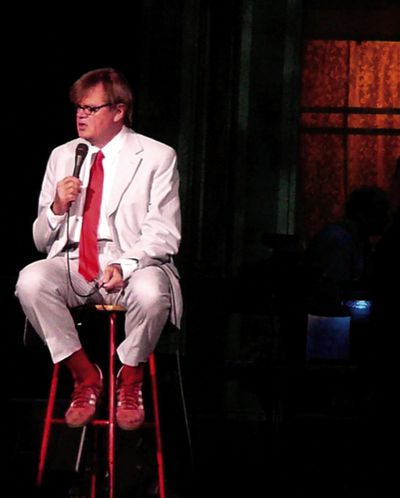Keillor snubs Bloomsday run’s Joyce connection

It’s been a riot of a week in Spokane, our home town, with “A Prairie Home Companion” at the Spokane Arena last Saturday and Bloomsday celebrated in Irish bars on Wednesday.
Most people miss the link between the June 16 Bloomsday, which was coined 88 years ago in the novel “Ulysses,” with Spokane’s Bloomsday, which involves 50,000 people running 12 kilometers around town on the first Sunday in May.
Garrison Keillor is no exception.
Keillor, a nationally acclaimed oral storyteller, led the cast and musicians of his National Public Radio show as they performed two hours of skits and songs to the obvious delight of 5,300 people who nearly packed the Arena’s Star Theatre.
Midway, Keillor devoted 4 minutes to a monologue highlighting Spokane life.
But he made an error that begs to be corrected.
In mentioning the city’s signature events, such as Hoopfest, he noted that “Bloomsday does not refer to James Joyce’s novel, ‘Ulysses,’ but to the lilacs” that bloom in spring.
Wrong.
“Usually if somebody makes the connection – right or wrong – it’s because they have a background in English literature,” said Don Kardong, Lilac Bloomsday Run founder.
Kardong, who spearheaded the run in 1977 following his fourth-place finish in the 1976 Montreal Olympics marathon, applied his background – he was an English major – to naming what would become Spokane’s rite of spring.
He called the race the “Lilac Bloomsday Run,” combining Spokane’s “Lilac City” moniker with a twist “Ulysses.”
The novel is a rough parallel of Homer’s story about Ulysses’ return to Ithaca after the Trojan War, which Joyce frames in a day in the life of newspaper ad salesman Leopold Bloom.
Joyce scholars refer to the day in 1904 he spent wandering Dublin’s streets as “Bloomsday.”
Both Homer and Joyce described an odyssey, which Kardong likened to a road race.
“We get questions about the name every year,” Kardong said. “So we’ve posted the explanation in the (Frequently Asked Questions) on the Bloomsday website so I can just cut and paste the reply.”
Nancy Roth of Spokane Public Radio immediately took blame for Keillor’s misstatement.
“Oops,” she said. “I believe I led (the show’s advance fact checker) astray on that point.”
Kardong took it in stride, as one would expect from an English major and world-class role model who finished a few strides short of an Olympic medal.
“Heck, we’re just glad to get a mention,” he said.